Key takeaways
- Break down the budget into categories like tickets, travel, and extras to avoid hidden costs and stress.
- Anticipate unexpected expenses by setting aside a buffer, enhancing peace of mind.
- Keep detailed expense tracking to stay connected to the event, making budgeting a positive part of the experience.
- Be flexible with plans, such as choosing cheaper seats or packing snacks, to achieve significant savings without compromising enjoyment.
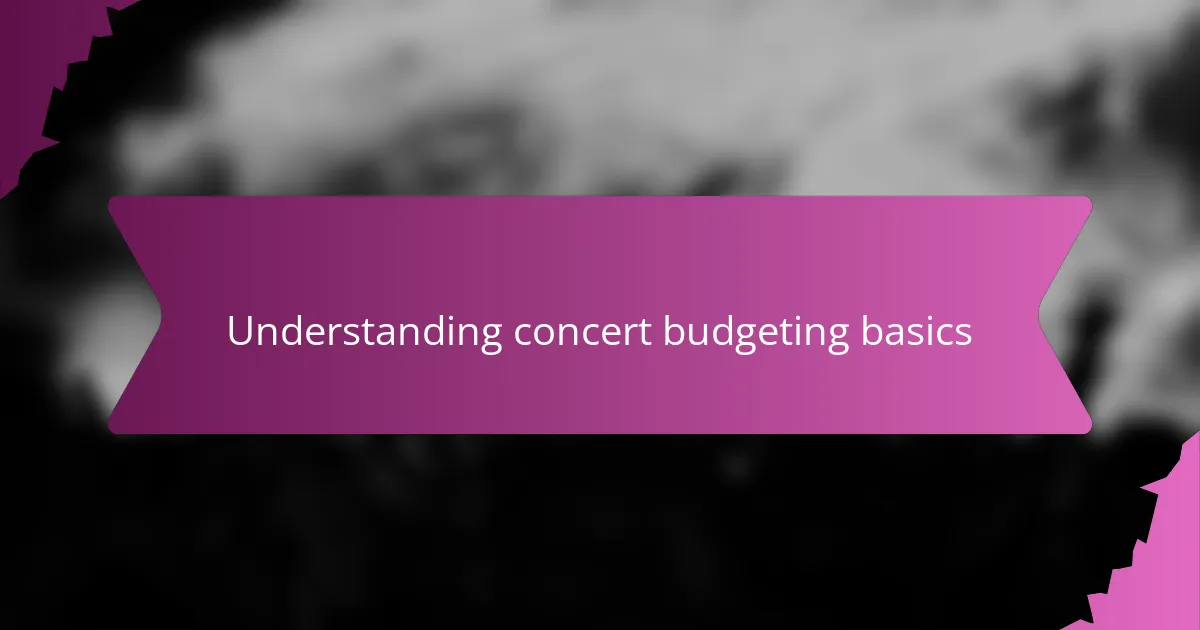
Understanding concert budgeting basics
When I first started planning for a concert at Madison Square Garden, the biggest lesson I learned was that budgeting isn’t just about ticket prices. There are so many hidden costs—transportation, food, merchandise—that can quietly eat away at your wallet if you aren’t careful. Have you ever thought about how much a simple subway ride can add up when you’re making multiple trips in a day?
It’s crucial to break down the overall budget into smaller categories, like tickets, travel, and extras. For me, this step brought clarity and helped avoid last-minute surprises. I found that anticipating those little expenses early on reduced a lot of stress and made the experience more enjoyable.
Most importantly, budgeting is about balancing what you want with what you can truly afford. When I asked myself, “Is this splurge worth the memory?” it became easier to make smart choices without feeling deprived. How often do we forget that keeping track of every dollar spent can actually enhance our excitement rather than diminish it?
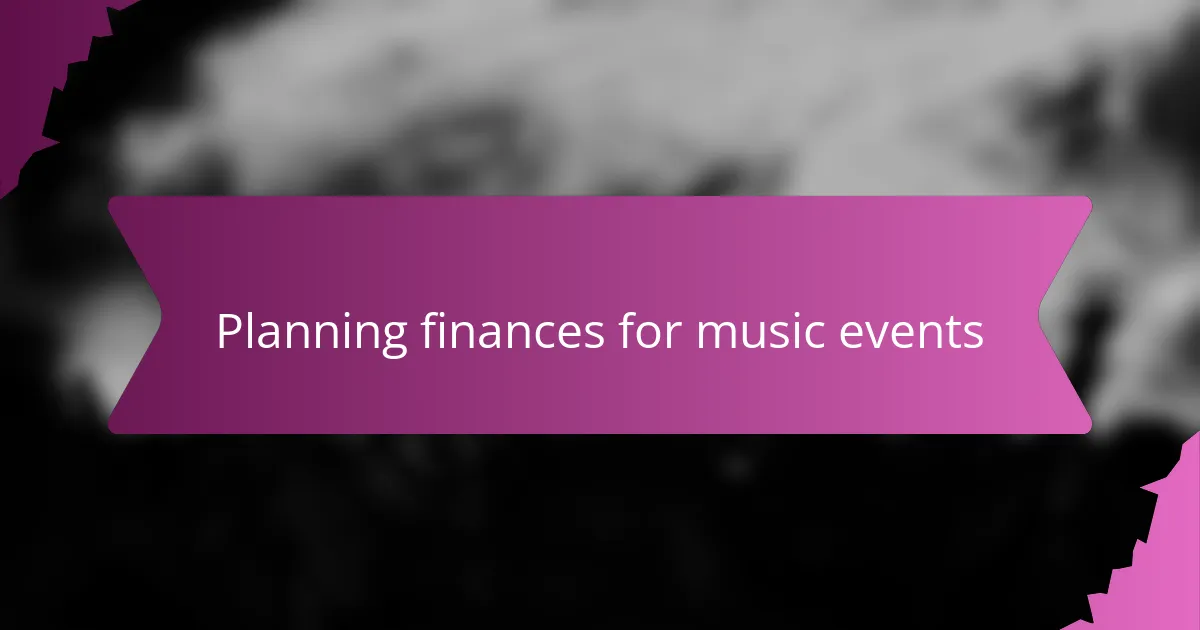
Planning finances for music events
Figuring out how to finance music events like concerts requires more than just counting dollars; it’s about prioritizing what truly matters to you. When I planned my trip to Madison Square Garden, I asked myself which experiences were non-negotiable and where I could scale back. That kind of reflection turns budgeting into a personal strategy rather than a bland checklist.
I also learned to anticipate a buffer for unexpected expenses. Have you ever been caught off guard by last-minute costs? Setting aside a small cushion eased my anxiety and meant I wasn’t frantically rearranging plans at the last minute—trust me, that peace of mind is priceless.
Lastly, tracking every expense felt tedious at first, but it became a way to stay connected to the event itself. Seeing how each dollar contributed to the overall experience made me feel more intentional and excited. Would you agree that mindful spending can actually heighten your enjoyment, instead of detracting from it?

Researching Madison Square Garden costs
When I dove into researching the costs at Madison Square Garden, one thing stood out immediately: ticket prices vary widely depending on the event and seating choice. Did you know that even for the same concert, seats just a few rows apart can have drastically different price tags? That realization made me pause and really think about what kind of view mattered most to me.
Beyond the tickets, I soon discovered that fees and taxes add a surprising chunk to the total cost. It was frustrating at first; I kept seeing numbers pop up only at checkout. Have you ever felt that sting when the final price is much higher than the sticker price? Knowing this early helped me avoid budget shock.
Finally, I looked into transportation and nearby food options around Madison Square Garden. Public transit seemed like the wallet-friendly choice, but I wanted to make sure it was convenient enough not to eat into my time or energy. Isn’t it funny how the little details—like a subway fare or a slice of pizza—can shape how you experience a night out? Taking these factors into account gave me confidence that my budget was realistic and thorough.
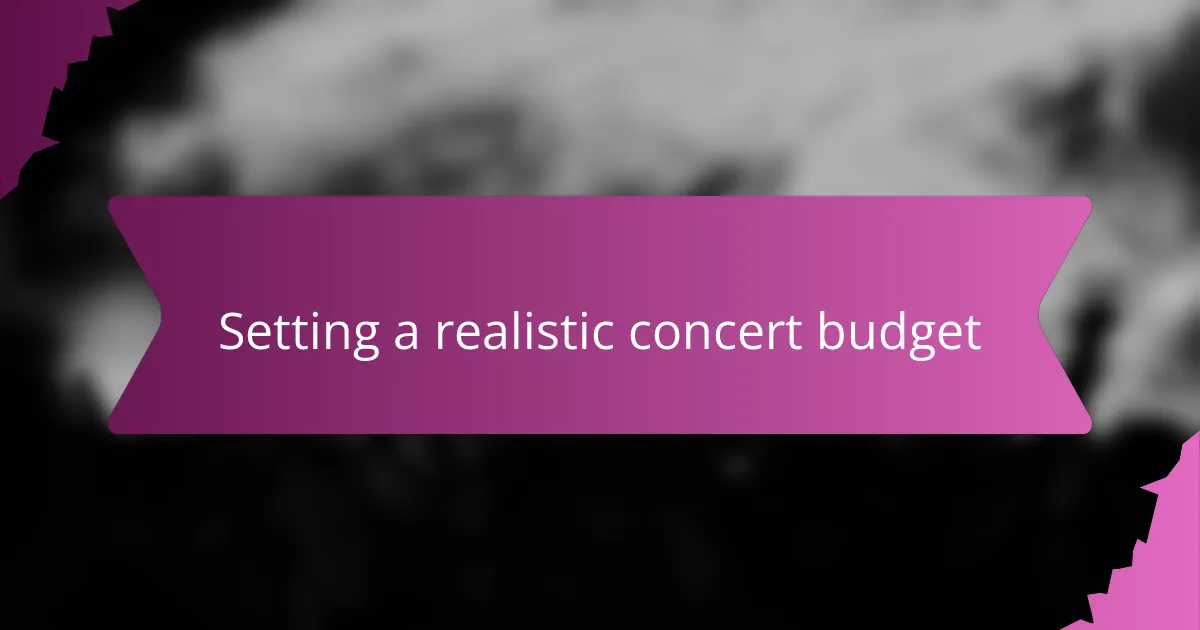
Setting a realistic concert budget
Setting a realistic concert budget means being honest with yourself about what you can comfortably spend without stress. When I set mine, I asked, “What’s absolutely necessary, and where can I afford to compromise?” That mindset helped me strike a balance between enjoying the experience and staying financially responsible.
I found it helpful to write down every anticipated expense, no matter how small, early in the process. Have you ever thought about how quickly costs add up when you don’t track them? For me, this practice turned vague worries into concrete numbers, making the whole plan feel manageable and real.
Sometimes, I had to adjust my expectations—like choosing slightly farther seats or packing my own snacks—to keep within budget. It wasn’t easy at first, but knowing I wouldn’t be scrambling later gave me peace of mind. Have you noticed how accepting some trade-offs can actually make the concert experience more rewarding?
![]()
Tracking expenses before the event
Before the event, I made it a point to track every potential expense in a simple spreadsheet. It wasn’t just about jotting down ticket prices; I included subway fares, snacks, and even a little extra for unexpected costs. Have you ever underestimated how those small things add up? I certainly did until I saw the numbers laid out—it was eye-opening.
Keeping this detailed list helped me feel more in control. Each time I made a purchase or planned a spending category, I updated the list to see how close I was getting to my limit. That small act turned budgeting from a chore into a game, and honestly, it made me feel more connected to the whole concert experience.
Sometimes, I caught myself wanting to splurge on merchandise or a nice dinner, but tracking expenses kept me honest. Did I really want that T-shirt, or was saving a few dollars for the ride home smarter? Asking myself those questions early on made the whole process less stressful and more enjoyable.
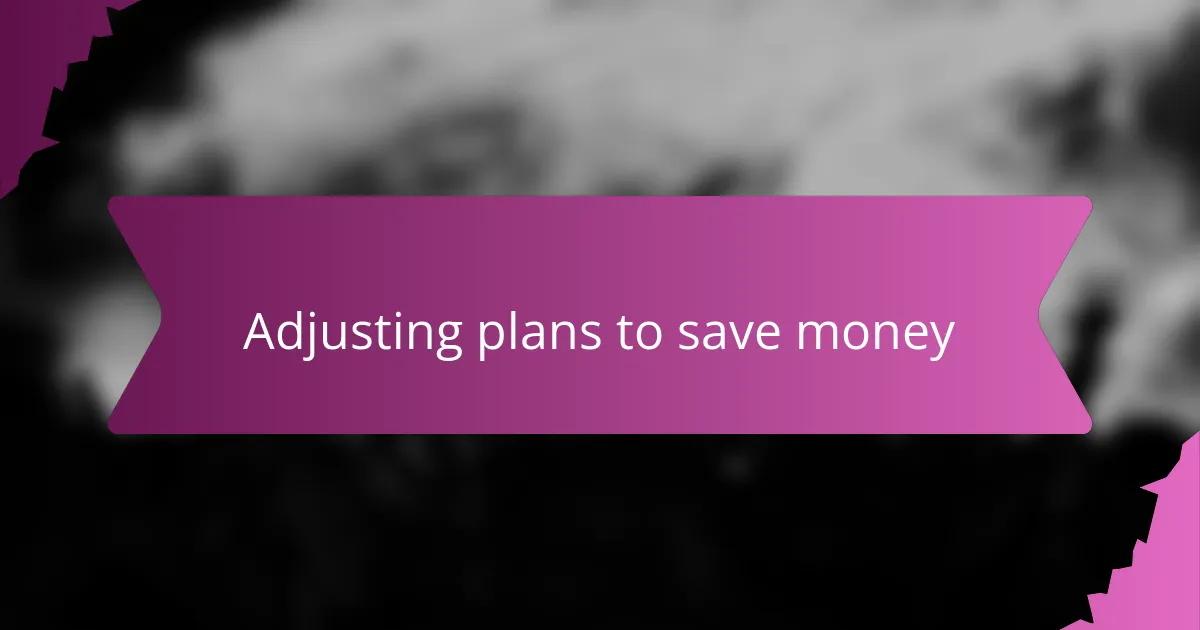
Adjusting plans to save money
One of the biggest shifts I made to save money was being flexible with my plans. Instead of aiming for the perfect seat upfront, I considered options a bit farther away that fit my budget better. Have you ever been surprised how moving back a few rows can drop the price dramatically without ruining the experience? For me, that small adjustment felt like a smart win.
I also decided to skip pricey food inside the arena and packed some snacks to bring along. It wasn’t the most glamorous choice, but avoiding overpriced concessions helped a lot. Would I rather have a full wallet or a fancy nacho? That question kept me grounded and surprisingly satisfied throughout the night.
Finally, I rearranged my transportation plans by using public transit instead of a rideshare, which saved a significant chunk. It cost a little more time and patience, but knowing I stayed within budget gave me peace of mind. Have you noticed how those small sacrifices add up to big savings? It’s a reminder that sometimes, adjusting plans isn’t about missing out—but about making smart decisions that keep the good vibes going.
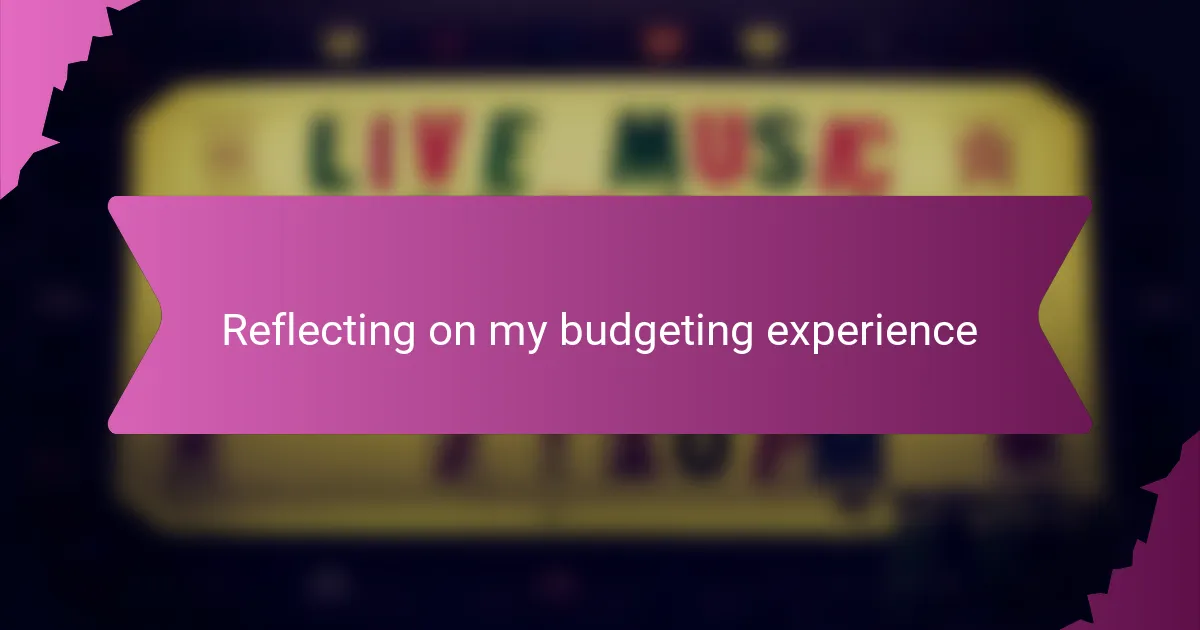
Reflecting on my budgeting experience
Looking back, what struck me most about this budgeting journey was how much it taught me about patience and flexibility. I realized that sticking rigidly to an initial plan often leads to unnecessary stress, while being open to tweaks made the whole process smoother—and actually kind of fun. Have you ever found that loosening your grip on plans can sometimes open doors you didn’t even expect?
Another thing I noticed is how mindful budgeting changed my perspective on the concert itself. Tracking every dollar didn’t feel restrictive; it made me appreciate each moment more because I knew exactly what I had sacrificed and saved for it. That sense of intention added a surprising layer of satisfaction—don’t you think knowing where your money goes helps you enjoy experiences more deeply?
At times, I caught myself wrestling with small temptations—like grabbing that cool band tee or splurging on a fancy bite—but reflecting on those choices made me realize something important: budgeting isn’t about denying yourself; it’s about deciding what truly enriches the experience. In hindsight, that mindset shift is probably the biggest takeaway I’ll carry forward to future concerts and beyond.